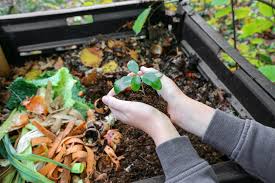An easy guide to composting at home

Why Home Composting Matters
While many local councils collect food and garden waste, home composting offers an eco-friendly and beneficial alternative. By composting at home, you eliminate the need for transportation and create nutrient-rich compost for your garden. It's a simple and rewarding process.
Reducing Your Environmental Impact
If your area doesn't have a food and garden waste collection service, your organic waste likely ends up in landfills. As organic matter decomposes in landfills, it releases methane, a potent greenhouse gas that contributes to climate change.
By composting at home, you divert organic waste from landfills and produce valuable compost. This natural fertilizer can enhance your garden's health and beauty.
Setting Up Your Compost Bin
Closed compost bins are popular choices, especially if you're concerned about aesthetics. Opt for a bin roughly waist-high to ensure optimal composting.
Choose a sunny spot with bare soil for your compost bin. If placing it on hard surfaces, add a layer of paper, twigs, or existing compost to attract beneficial organisms.
Remember to consider accessibility when choosing a location. You'll need easy access to add ingredients and remove compost.
What Can I Compost?
You can compost a wide variety of materials, from common kitchen scraps to surprising household items. Aim for a balanced mix of "green" and "brown" materials to create nutrient-rich compost.
Green Materials (Nitrogen-Rich):
- Fruit and vegetable scraps
- Tea bags and coffee grounds
- Cut flowers
- Grass clippings and leaves
- Young weeds
- Garden and houseplant trimmings
Brown Materials (Carbon-Rich):
- Cardboard and paper
- Straw and hay
- Egg shells
- Wood chips and sawdust
- Vacuum cleaner dust
- Hedge and woody trimmings
What Can't I Compost?
To avoid contamination and unpleasant odors, avoid composting the following:
- Cooked food
- Meat, fish, and bones
- Dairy products
- Bread and baked goods
- Diseased plants
- Coal or coke ash (small amounts of wood ash are okay)
- Pet waste
- Diapers, glass, plastic, or metal
By composting responsibly, you can reduce your waste and create valuable fertilizer for your garden.
The Waiting Game
Compost takes time to mature. It typically takes over a year for your compost to be ready for use. Patience is key, as nature will do the heavy lifting.
To keep the composting process going, continue adding a mix of green and brown materials to your bin. Stirring the compost occasionally can speed up the process by improving aeration and preventing compaction. However, if you can't stir it, don't worry – the compost will still mature, just a bit slower.




comment